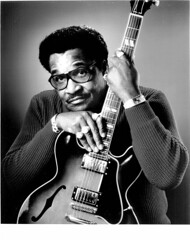Little Milton Passes Away
A few weeks, Andrew heard a song on Bluesville on XM by Little Milton, "Find Somebody to Love." Since that, he became a Little Milton fan.
I heard Wednesday, August 10, that Little Milton had passed away the Thursday before.
We've heard several of his songs, including one with this title: "Hey Mister, Your Wife is Cheating On Us." Love the title, and the song.
Here's the AP article:
“Little” Milton Campbell, who sang the blues and performed with some of the country's top performers, died Thursday of complications of a stroke.
Campbell, 70, died about 8:50 a.m. at Delta Medical Center in Memphis, Tenn. A statement from the family said the musician died from a cerebral hemorrhage as a result of a stroke Campbell suffered on July 27.
Funeral services were pending. Campbell is survived by his wife, Patricia, and three children.
Greg Preston, a close friend and producer of Campbell's Grammy-nominated album 2000's “Welcome to Little Milton,” visited the singer in the hospital over the weekend.
Preston said he played some of the bluesman's music in an attempt to bring him out of his comatose state.
”I hope he heard me,” Preston said.
The Inverness native had been scheduled to perform Aug. 11 at Clarksdale's Ground Zero Blues Club for the blues documentary “Native Sons,” but that performance was canceled.
Campbell's last appearance in Jackson was at The Allman Brothers Band concert in May.
Preston described the bond between Campbell and The Allman Brothers Band, especially Wayne Haynes as “beautiful.”
”They (Campbell and Haynes) had this love for each other. When they played together it was beautiful because they knew...what the other was gonna do,” Preston said. “There was a kindred spirit there.”
Campbell is best remembered for his booming voices, one that Preston said resonated with audiences nationwide.
”Every time I was in the studio with him his voice was bigger than the whole building,” he said. His detail to every note played on his Gibson Hollowbody 355 guitar made him a truly unique artist, he said.
”Most guitar players they think the more notes the better. Milton, B.B. and Albert King — their style was you make every note count. Because one note can touch an amazing amount of people.
”It's not how many you play or how fast you play. It's how you play that one note. That was his style.”
Campbell's hit record “We're Gonna Make It” and his 1978 vintage black jacket were on display in Clarksdale last year as part of a “Sweet Home Chicago” exhibit at the Delta Blues Museum.
In an interview with The Associated Press last year, Campbell said the exhibit would raise the awareness of blues music and performers.
”The people are the stars, not me,” Campbell said after attending the exhibit's opening last July. “I am just one that is fortunate to have a little talent. When you do it right, they remember you and that is important to me.
”To realize that they are trying to immortalize in a sense your contribution to your profession, certainly none of us are going to live forever, basically in a sense it sort of makes you immortal to know that once you are gone, people are going to walk by and some will say 'you were great.' Some will say 'maybe you weren't so great,”' he said.
Campbell's music was described as having a gritty feel, with pleading vocals and frequently lyrics of dashed love.
Campbell was born on a Delta farm near Inverness on Sept. 7, 1934. He was named after his father, Big Milton, who was a locally known blues musician.
In 1953, Campbell was introduced to Sam Phillips of Sun Records by artist/talent scout Ike Turner. Some of his first recordings were on the Sun label backed by the Ike Turner Band.
In a 2003 tribute to the late Phillips, Campbell said Phillips cared little about critics who were unhappy with “what they called at that time, black music.”
”He would always say, 'Well, I don't worry about what nobody else say. I'm going to do what I want to do,”' Campbell said.
Campbell went on to record “I'm a Lonely Man” and “That Will Never Do” for Bobbin Records. He switched to Checker Records in 1960 and in 1965, he had a hit entitled “We're Gonna Make It.”
Campbell joined Stax Records in 1971 and recorded “Annie Mae's Cafe” and “Little Bluebird,” two of his most memorable songs.
Campbell was presented with the W.C. Handy 1988 Blues Entertainer of the Year. He was also inducted into the Blues Hall of Fame that year.
The Delta native also enjoyed a career with Malaco Records in Jackson, which began in 1984. At the label he wrote “The Blues Is Alright” and recorded the album “Welcome To Little Milton,” which was nominated in 2000 for Best Contemporary Blues Album.
At his death, Campbell was signed with the label Telarc International based in Cleveland, Ohio. His last album “Think of Me” was released in May 2005.
In a statement, Pat Campbell and the label expressed thanks for the “outpouring of support from well-wishers throughout the blues community.”
Telarc spokeswoman Amanda Sweet said condolences can be directed to the Campbell family through the record label and monetary donations can be made through a fund established at the St. Jude Children's Research Hospital in Memphis.
I heard Wednesday, August 10, that Little Milton had passed away the Thursday before.
We've heard several of his songs, including one with this title: "Hey Mister, Your Wife is Cheating On Us." Love the title, and the song.
Here's the AP article:
“Little” Milton Campbell, who sang the blues and performed with some of the country's top performers, died Thursday of complications of a stroke.
Campbell, 70, died about 8:50 a.m. at Delta Medical Center in Memphis, Tenn. A statement from the family said the musician died from a cerebral hemorrhage as a result of a stroke Campbell suffered on July 27.
Funeral services were pending. Campbell is survived by his wife, Patricia, and three children.
Greg Preston, a close friend and producer of Campbell's Grammy-nominated album 2000's “Welcome to Little Milton,” visited the singer in the hospital over the weekend.
Preston said he played some of the bluesman's music in an attempt to bring him out of his comatose state.
”I hope he heard me,” Preston said.
The Inverness native had been scheduled to perform Aug. 11 at Clarksdale's Ground Zero Blues Club for the blues documentary “Native Sons,” but that performance was canceled.
Campbell's last appearance in Jackson was at The Allman Brothers Band concert in May.
Preston described the bond between Campbell and The Allman Brothers Band, especially Wayne Haynes as “beautiful.”
”They (Campbell and Haynes) had this love for each other. When they played together it was beautiful because they knew...what the other was gonna do,” Preston said. “There was a kindred spirit there.”
Campbell is best remembered for his booming voices, one that Preston said resonated with audiences nationwide.
”Every time I was in the studio with him his voice was bigger than the whole building,” he said. His detail to every note played on his Gibson Hollowbody 355 guitar made him a truly unique artist, he said.
”Most guitar players they think the more notes the better. Milton, B.B. and Albert King — their style was you make every note count. Because one note can touch an amazing amount of people.
”It's not how many you play or how fast you play. It's how you play that one note. That was his style.”
Campbell's hit record “We're Gonna Make It” and his 1978 vintage black jacket were on display in Clarksdale last year as part of a “Sweet Home Chicago” exhibit at the Delta Blues Museum.
In an interview with The Associated Press last year, Campbell said the exhibit would raise the awareness of blues music and performers.
”The people are the stars, not me,” Campbell said after attending the exhibit's opening last July. “I am just one that is fortunate to have a little talent. When you do it right, they remember you and that is important to me.
”To realize that they are trying to immortalize in a sense your contribution to your profession, certainly none of us are going to live forever, basically in a sense it sort of makes you immortal to know that once you are gone, people are going to walk by and some will say 'you were great.' Some will say 'maybe you weren't so great,”' he said.
Campbell's music was described as having a gritty feel, with pleading vocals and frequently lyrics of dashed love.
Campbell was born on a Delta farm near Inverness on Sept. 7, 1934. He was named after his father, Big Milton, who was a locally known blues musician.
In 1953, Campbell was introduced to Sam Phillips of Sun Records by artist/talent scout Ike Turner. Some of his first recordings were on the Sun label backed by the Ike Turner Band.
In a 2003 tribute to the late Phillips, Campbell said Phillips cared little about critics who were unhappy with “what they called at that time, black music.”
”He would always say, 'Well, I don't worry about what nobody else say. I'm going to do what I want to do,”' Campbell said.
Campbell went on to record “I'm a Lonely Man” and “That Will Never Do” for Bobbin Records. He switched to Checker Records in 1960 and in 1965, he had a hit entitled “We're Gonna Make It.”
Campbell joined Stax Records in 1971 and recorded “Annie Mae's Cafe” and “Little Bluebird,” two of his most memorable songs.
Campbell was presented with the W.C. Handy 1988 Blues Entertainer of the Year. He was also inducted into the Blues Hall of Fame that year.
The Delta native also enjoyed a career with Malaco Records in Jackson, which began in 1984. At the label he wrote “The Blues Is Alright” and recorded the album “Welcome To Little Milton,” which was nominated in 2000 for Best Contemporary Blues Album.
At his death, Campbell was signed with the label Telarc International based in Cleveland, Ohio. His last album “Think of Me” was released in May 2005.
In a statement, Pat Campbell and the label expressed thanks for the “outpouring of support from well-wishers throughout the blues community.”
Telarc spokeswoman Amanda Sweet said condolences can be directed to the Campbell family through the record label and monetary donations can be made through a fund established at the St. Jude Children's Research Hospital in Memphis.








<< Home